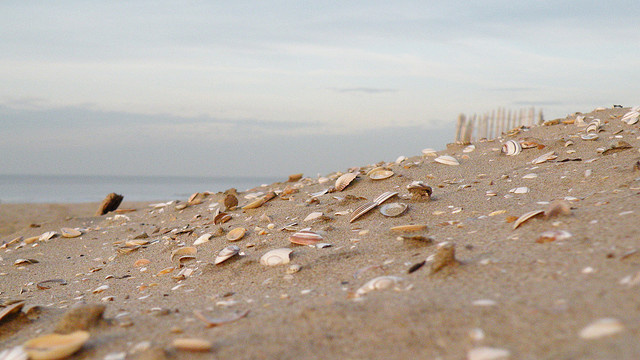When we go to the beach, we inevitably wind up strolling down the waterline searching for beautiful shells—shells that are fully intact, bright and flawless.
We are very particular about the ones that we pick up, making sure they’re intact, with no scratchy edges or holes.
When we find one of these, we become giddy with excitement. We carefully place it in our pocket or our palm and make sure not to break it or scratch it.
We arrive home, and we carefully display it in a shadowbox or on a shelf, telling visitors the story of where we found it and with whom. We feel lucky to have found those perfect shells.
What about the sand?
We dig our toes into it. We bury our loved ones so that we can only see their head and their wide, camera-ready grin. There’s something soothing about the sand filling the gaps between our toes as we walk down the beach, hand-in-hand with the person who fills the gaps in our heart.
The sand that we play with and make castles from—the sand that cushions our weary feet—is synonymous with relaxation and bliss.
However, we don’t like to bring home the sand.
It gets stuck in our clothes, between our toes and in every crack and crevice of our bodies. It’s a nuisance, and we can’t vacuum it up quickly enough.
Heavens no, don’t get it in the bed! Wipe it off your feet before you dare take a step into the room where our beautiful, whole shells are displayed.
Lest we forget—this cursed sand was made from the broken and scratched shells that we discarded. Furthermore, those shells that we tossed aside were once just like those we now proudly display.
But what about those broken shells?
Those shells we threw back in to the waves? Those pulled back out to the ocean by the undercurrent? What about those small fragments, polished smooth by the turbulent water?
Why don’t we collect those shells?
Haven’t those beautifully imperfect shells, that continue to land at our feet, proven their strength by simply still being? Why covet only the shells that have ridden along the top of the water, safely protected by seaweed or gentle winds?
Why not collect and display those that have made it despite their turbulent existence?
Why do we seek out and treasure the new and perfect, but toss aside the old, battered and worn?
I think, given the choice—I would choose to be the rough, shattered shell that is eventually ground down into the sand.
I’d like to be the sand that cushions a three-year-old’s feet and is used to create majestic castles, only seen in fairy princess and fearless knight fantasies. I’d like to be the sand that eases the tired, brittle bones of elderly couples who stroll hand in hand, reminiscing about their earlier days, but who wouldn’t change a thing given the chance.
And while sophisticates and materialistic people would toss me back into the ocean—those with pure and true hearts would find joy in my soft, comforting existence.
So next time you go to the beach and find yourself collecting shells—don’t pass by the small and dulled fragments. Pick them up, carefully place them in your pocket until you get home, and then place them in a beautiful bowl for all to see.
Tell your friends the story of where you found them and with whom. Tell your friends how these beautiful shells have brought comfort to the toes of your babies and to your parents’ aching joints.
Gaze at them—wonder from where they’ve traveled and what they’ve endured.
Could these broken shells be the fragments of those that soothed our own feet, years and miles ago? How many have smiled from using their brokenness to comfort?
If you can’t get to the ocean, come over—have some freshly brewed iced tea. I’d love to share with you my glass jar of beautifully broken shells.
Relephant Read:
I’m Beautifully Broken—Please don’t Fix Me.
.
Author: Meridith Ferber
Editor: Yoli Ramazzina
Photo: Flickr/Frapestaartje












Read 0 comments and reply